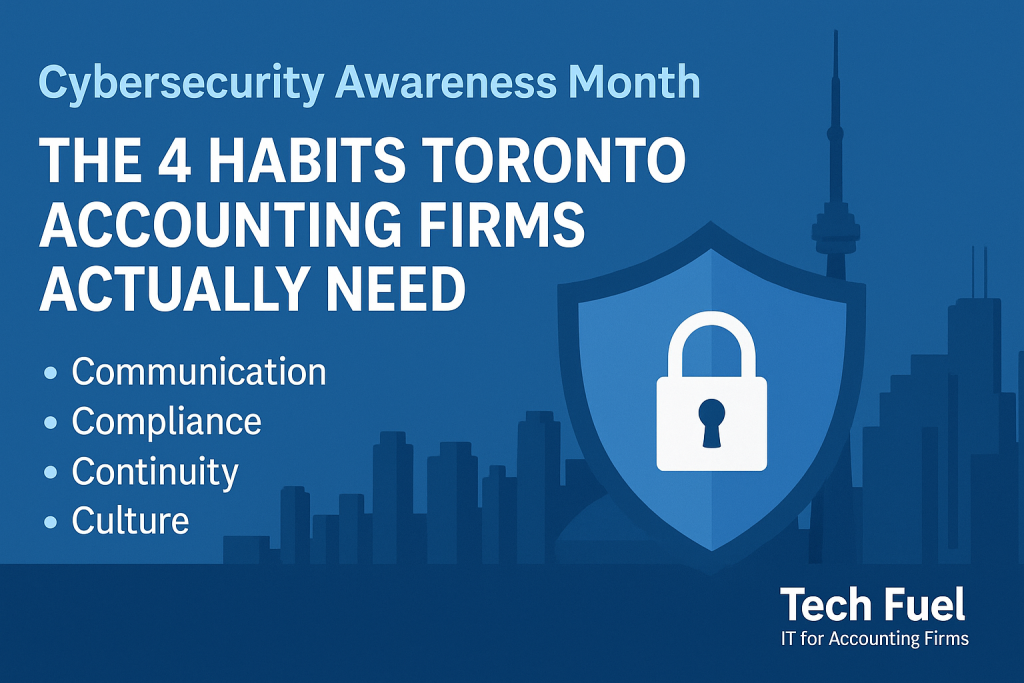Cybersecurity Awareness Month: The 4 Habits Toronto Accounting Firms Actually Need
October might be “Cybersecurity Awareness Month,” but let’s be honest—hackers don’t work a 30-day contract. If you’re running an accounting practice in the GTA, every month is high-stakes. You’re sitting on SINs, tax returns, payroll files, and enough client secrets to make a Netflix thriller. And most breaches don’t start with a hoodie-wearing genius; they start with everyday habits—someone clicks a crafty link, skips an update, or reuses that one “great” password… again.
Good news: small, boring habits beat flashy tools every time. Here are the four cyber habits I want every Toronto firm to bake into daily life—no drama, just discipline.

Do this:
1) Communication: Make Security a Standing Agenda Item
If security only shows up when something’s on fire, you’ve already lost. Keep it conversational and constant.
- Three-minute “Phish Break” at Monday standups: one real screenshot, one tip (“hover before you click”), one applause for last week’s sharp catch.
- Share local scam intel: CRA-themed phishing, fake DocuSign requests, “urgent EFT change” emails from “clients.” When staff know what’s circling in inboxes, they’re faster on the draw.
- Normalize reporting: a Slack/Teams channel called #phish-or-foul where people drop suspicious stuff—no shaming, only thank-yous.
Why it works: When security talk is routine, it stops feeling like extra work and starts feeling like muscle memory.
2) Compliance: Treat Trust Like It’s Auditable
You don’t just keep clients compliant—you are a compliance business. Even if you’re not a bank, you still owe clients confidentiality and due care. Think PIPEDA principles, CPA ethical standards, written policies, and proof you
follow them.
Do this:
- Policy, then proof: Acceptable Use, Clean Desk, Data Retention, Vendor Access, Remote Work. Store them in one place. Get annual sign-offs.
- Training with receipts: track attendance and completion. If it isn’t documented, it didn’t happen.
- Vendor discipline: list every app that touches client data (CaseWare, QBO/Xero, Microsoft 365, e-signature). Confirm MFA is on, regions are Canadian-friendly, and access is least-privilege.
- Breach-ready: have a simple incident playbook—who leads, who contacts clients, and how you preserve evidence. You’ll sleep better just knowing it exists.
Why it works: Compliance isn’t about avoiding fines; it’s about protecting the one metric that matters most in this profession—client trust.
3) Continuity: Practice Getting Back Up—Before You Fall
Downtime in February is not the same as downtime in August. Restoration speed is your competitive advantage.
Do this:
- Backups you can prove: automatic, immutable, off-site. Test restores monthly. Pick one critical file and put it back on a spare machine—no theory, real life.
- Know your numbers: define RTO (how fast you need to be back) and RPO (how much data you can afford to lose). For most firms: RTO in hours, RPO in minutes.
- Tabletop, not guess-top: run a one-hour “ransomware day” drill each quarter. Who calls whom? Which servers first? What’s the client message? You’ll find the gaps in a safe room, not under a siren.
- Tier your apps: priority order for restore—email & authentication, practice management, file shares, tax/audit platforms, then everything else.
Why it works: Backups don’t save businesses. Restores save businesses.
4) Culture: Reward the Behaviour You Want Repeated
Your people are the perimeter. Tools help; culture wins.
Do this:
- MFA everywhere: Microsoft 365, CaseWare Cloud, remote access, password managers. No exceptions for “power users.”
- One password to rule them all—safely: firm-wide password manager with shared vaults for client portals and SOPs for handover when staff leave.
- Patch like you mean it: weekly cadence for endpoints and servers; emergency window for high-severity stuff.
- Celebrate defenders: shout-outs and small rewards for reported phish, clean desks, and smart access requests. Hero stories spread.
Why it works: Culture turns “optional” into “obvious.”
Quick Wins You Can Do This Week
- Add a 3-minute Phish Break to Monday’s meeting.
- Turn on conditional access + MFA policies in Microsoft 365.
- Pick one file and do a test restore—time it.
- Inventory every app that touches client data; confirm MFA and data residency settings.
- Publish a one-page Incident Playbook and tell staff where it lives.
The Bottom Line
Cybersecurity Awareness Month is a great excuse to start, but habits are what keep you safe in April when the phones won’t stop and the inbox is a war zone. Build communication, compliance, continuity, and culture into the way your firm already works—and you’ll feel the stress drop and the confidence rise.
Ready to make this real?
If you want the “no-drama” version of all this, that’s literally what we do for Toronto accounting firms. We’ll tighten policies, train your team, test your backups, and tune your stack—without slowing down your billables.
Book a free discovery call with Tech Fuel, and let’s build you a cyber-smart firm that stays calm in tax season and confident the rest of the year.


